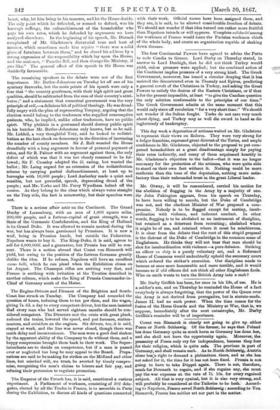The remaining speakers in the debate were not of the
first importance. Mr. Butler-Johnstone on Tuesday let off one of his sputtery fireworks, but the main points of his speech were only a fear that "the country gentlemen, with their high spirit and great qualities, should be subtracted from the sum of their country's attri- butes ;" and a statement that numerical government was the very principle of evil,—a delicious bit of political theology. He was dread- fully angry with the plan of representing Torquay, arguing that the election would belong to the tradesmen who supplied consumptive patients, who, he implied, unlike other tradesmen, have no public spirit. Why phthisis in a gourmand should destroy public spirit in his butcher Mr. Butler-Johnstone only knows, but so he said. Mr. Liddell, a very thoughtful Tory, said he looked to redistri- bution as the best check on democracy in the direction of increasing the number of county members. Sir J. Rolt wearied the House dreadfully with a long argument in favour of personal payment of rates, and Sir R. Palmer with an argument against them, the only defect of which was that it was too closely reasoned to be fol- lowed; Sir F. Crossley adobted the 5/. rating, but wanted the ballot ; Mr. Laing argued for an extension of the redistribution scheme by carrying partial disfranchisement, at least up to boroughs with 10,000 people ; Lord Amberley made a quiet and sensible, but not powerful, speech, deprecating dread of the people ; and Mrs Yorke and Mr. Percy Wyndham bolted off the course. As they belong to the class which always votes straight on the Tory side, the fact is noteworthy, but their speeches were not.


































 Previous page
Previous page